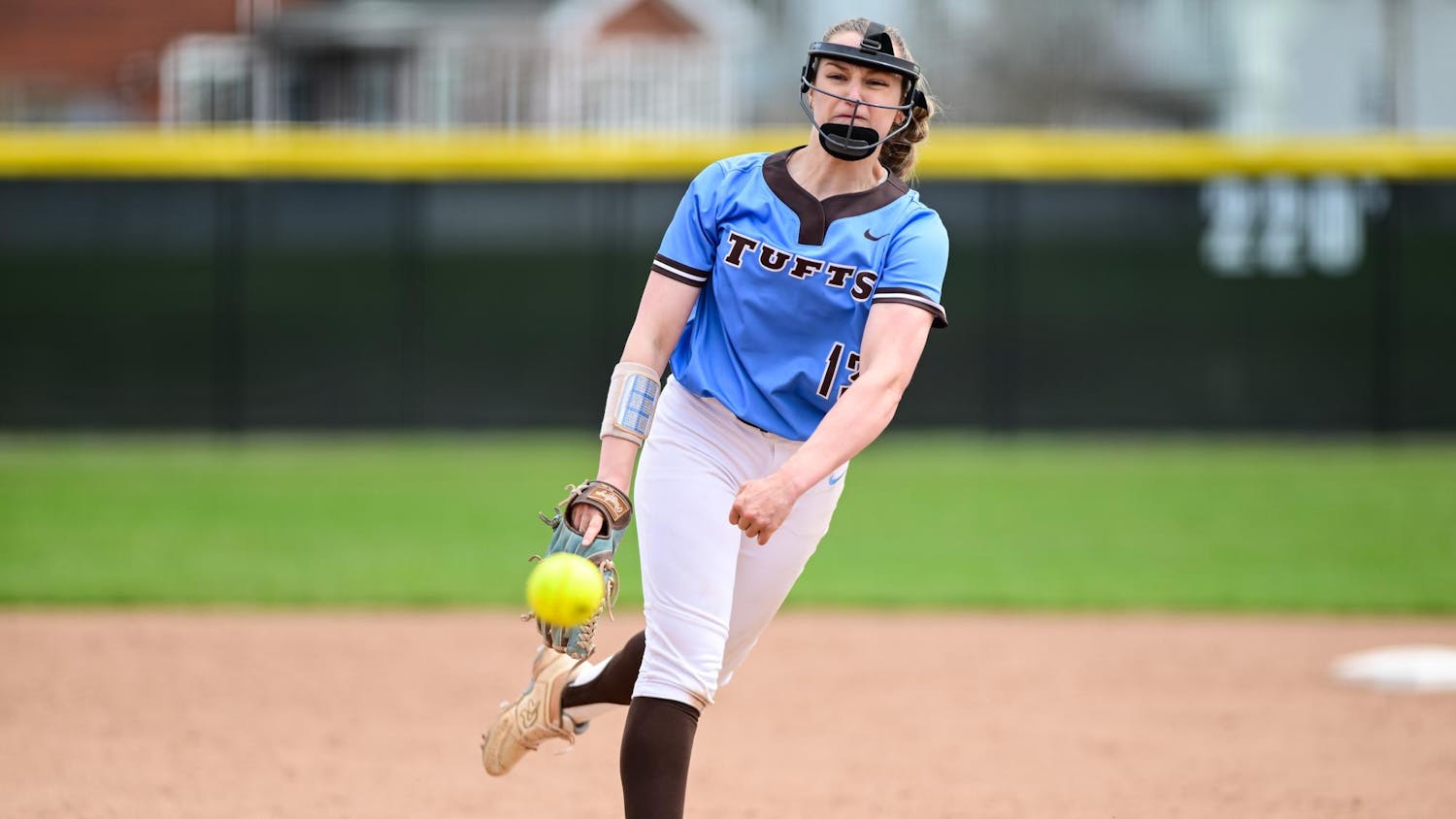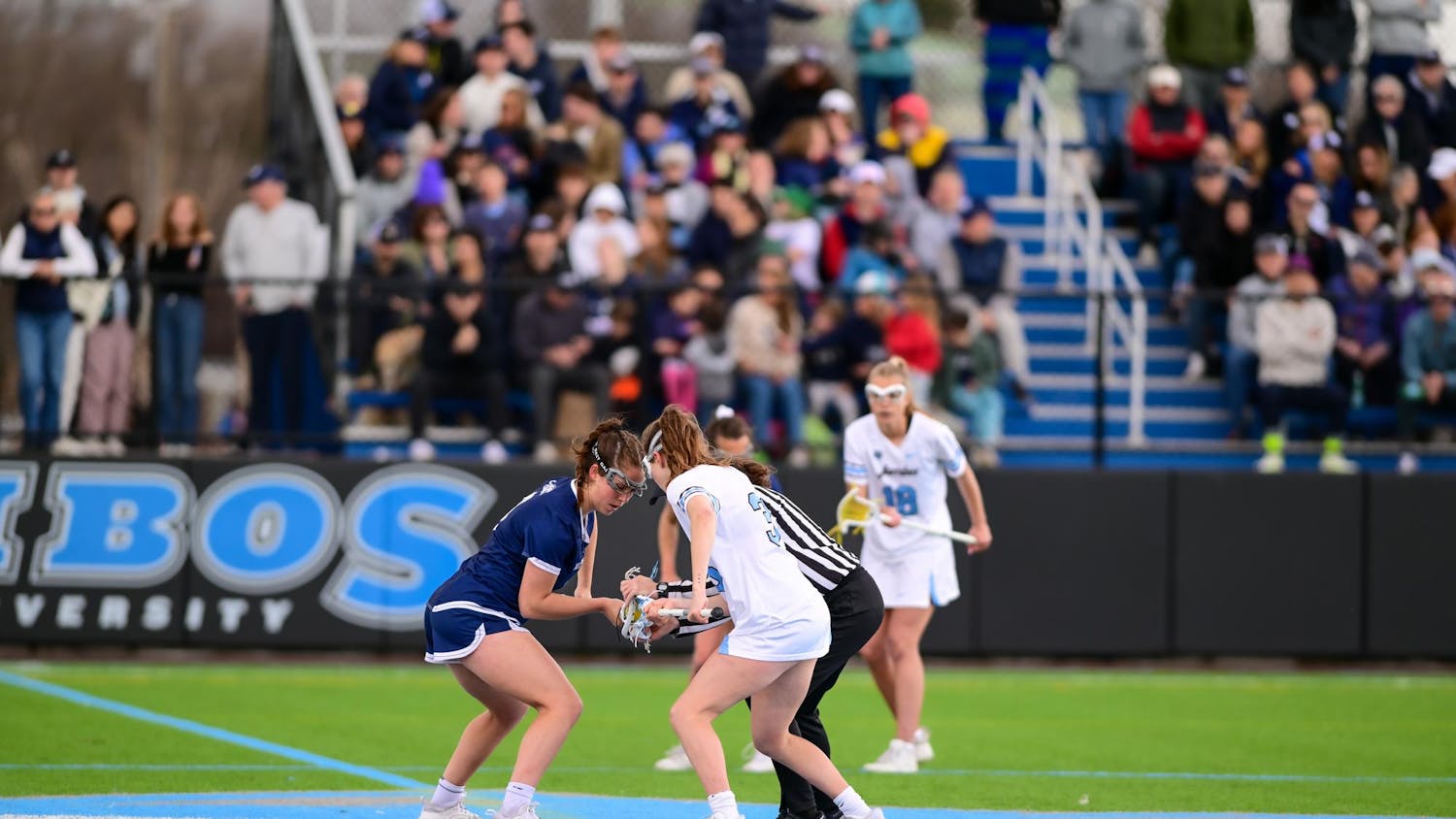Tufts athletics has recently experienced widespread success across sports, and a huge reason for that is the series of former players trading their spots on the roster for new positions on their respective teams as coaching staff after graduation. The first part of this series covered women's tennis assistant coach Samantha Gann and women's basketball assistant coach Kate Barnosky. This installment tells the stories of men's soccer assistant coach Connor Brown (E '16) and men's lacrosse assistant coaches John Uppgren (LA '16) and Jon Sax (LA '16).
Brown knew from the moment he graduated that there was no way Tufts soccer would not be part of his life moving forward.
“To be honest, Tufts soccer has been my family here for the past four years,” Brown said. “The second I found out I was still going to be here, I started talking to coach [Josh] Shapiro about being on board. I didn’t really know what role I was going to have, but I knew I wanted to be part of this team, be part of Tufts soccer.”
Once Shapiro learned that his former tri-captain was staying at Tufts to further his studies in structural engineering, he did not hesitate to offer Brown a position on his coaching staff. Brown has so far been involved in a variety of tasks in his new role, including preparing scouting reports, leading practices focused on crossing and shooting in smaller numbers and coaching the wide midfielders when the game is underway.
“He’s a knowledgeable soccer player, he’s tactically very adept, he always had a good relationship with younger players in the team, he’s incredibly passionate about Tufts soccer,” Shapiro said. “Those principles made me feel like he’d have a great influence and he’s been an excellent positive mentor, just someone to look at and talk to for young wingers who frankly need some guidance, and he’s been a big reason that they’ve improved as the season’s gone on, a big part of our success.”
Uppgren and Sax, both newly appointed as assistant coaches to the Tufts men’s lacrosse team this year, feel the same way about the lacrosse team that Brown does about the soccer team. The lacrosse team has a tradition of Tufts players going on to be coaches at Tufts, according to Uppgren. That helped Uppgren and Sax make up their minds about joining the coaching staff.
“We’ve had a great tradition of Tufts players being coaches at Tufts, so that was something that sparked my interest early,” Uppgren said. “It seemed like a great way to stay involved in the program and the game itself, so when the staff cleared out this summer, it seemed like a great way to start, and there’s no place I’d rather be at, so everything lined up.”
According to Sax, an added benefit is that former players are familiar with the program, which allows them to work better with the team in general.
“We play a very unique style. There’s no indoctrination or reordering of thinking that needs to take place [for] us, as we kind of already know the system, which is a huge advantage,” Sax said. "It’s personal to us -- we love Tufts lacrosse, we love the program. It’s not just 'it’s just coaching, it’s just my paycheck,' it’s also our family. Tufts lacrosse is family to us, and we want to do everything to protect the success we built here. The guys know that we are family too, so that’s a huge advantage.”
The same is true in soccer. Shapiro noted that as a result of the short preseason and offseason to coach players in NESCAC, having coaches who are familiar with the system allows for valuable individualized training.
"When your staff can be diverse enough to have specialization in different areas of the team, there’s a great ability to actually coach one-on-one, talk about specific situations," Shapiro said. "I think [Brown] has brought a lot to our outside midfielder play because of his intimate knowledge of our system and, frankly, his ability to be successful in it.”
Brown explained that having a former player around helps foster a sense of trust and unity within the program, particularly because they have fought similar battles and shared similar experiences as current players.
“I think [having a former player on the coaching staff] helps because I’m familiar with them, [and] I hope I’ve earned their respect in the past few years playing with them,” Brown said. “I think it helps me to have been there … they can look to me and say, ‘okay, he was running suicides at 7 a.m. in the offseason with me, he was coming in for preseason and working hard.' Having been there and done that has definitely helped me earn and keep the respect of the guys I played with.”
Brown, Uppgren and Sax were all part of national championship-winning teams. Men's soccer won the 2014 NCAA Championship and men's lacrosse took home consecutive NCAA titles in 2014 and 2015. Men's soccer also won the national championship this season, so Brown joins the exclusive club of individuals who have won national titles as both player and coach. The current players can trust their assistant coaches to embody and help maintain Tufts' winning culture after having played at the highest levels of Div. III competition as Jumbos themselves.
“I think it’s more useful than just having the coaches themselves,” lacrosse sophomore midfielder James Firpo said. “It’s better for all the kids who had them here as teammates, because the bond between us is now stronger than it could have ever been. I think it’s an incredible dynamic to have them as our coaches, because they know the best for this program, everything it’s about, everything it could possibly be about.”
Nevertheless, there are some new professional boundaries that need to be drawn for the players-turned-coaches to effectively do their jobs.
“I think if both parties want to have a successful player-coach relationship, it has to be a different dynamic,” Sax said. “That’s not to say we’re not ourselves, [because] we certainly are, but we can’t necessarily have the same relationships we had with players. Do we talk about things outside lacrosse? Absolutely. Do we have meaningful relationships with those guys and connect on a personal level? Absolutely. But we can’t have that dynamic [of hanging out with the guys in the off-campus house on the weekends] anymore. Obviously the team and pursuing national championships is the number one goal of the program.”
The leadership positions that these former players held helps smoothen the transition from peers into a more professional relationship.
“What helps that is that both of us had pretty significant leadership roles as players in our time,” Sax said. “You keep all that leadership and get rid of the things that wouldn’t be appropriate for a player-coach leadership.”
Shapiro recognizes the challenges that come with the shifting dynamic coming with the new position.
“I think the biggest challenge is there for the young coach, having to establish a line of ‘our relationship isn’t what it was, now that I’m working with as a staff’,” Shapiro said. “I think [Brown] trying to set those boundaries with friends could be a challenge, but [Brown's] always been a guy whose taken his soccer very seriously, and that if he was going to do [coaching], he was going to do it right.”
Even so, Shapiro added that the value of having an former player on the coaching staff can help some of the younger players transition into their college experience.
“[Brown's] still someone who’s really approachable, someone who they can come speak to about their college experience,” Shapiro said. “It’s important in a program to have guys who are approachable and very aware of what the current player is dealing with and help them navigate.”
First-year Zach Trevorrow was grateful for the technical and emotional support that Brown has offered this year.
“I think Connor has been a really big mentor for me this season, kind of in between as a coach and a player," Trevorrow said. "He understood what it’s like to be a player, having only graduated last year, so it was really nice to have someone that could guide us through our first year and the new challenges that playing college soccer for the first time would bring."
Trevorrow and Brown both play outside midfielder and both wore the same jersey number, 14. Brown's familiarity with the position put him in a strong position to help Trevorrow develop.
“He could guide me in a way that was unique to him, [and] I learned a lot of what I did this year from him," Trevorrow said. "He knows what it’s like to start out, what level is expected of a left winger and the kind of situations we are put in. He’s coached me a lot in terms of my one-on-one play, how to be relaxed on the ball, tactical ways I could change up my game. The individual help I’ve gotten from him, it’s something I really appreciated.”
Tufts’ leading goalscorer this season, senior forward Gaston Becherano, said that Brown helped galvanize the team in the right direction in its recent championship victory in Salem, Va.
“I roomed with [Brown] on the trip [to Nationals], and I kept speaking about how cool the experience was,” Becherano said. “He pulled me aside and said, ‘yeah, it’s a cool experience, but I still want you to focus on the goal. Enjoy it, but you’re coming here on a business trip.’ He actually helps people to get in the right mentality for the game, and I think that’s something only he can do, because he’s been a player and people have seen him as a friend and respect him.”
From player to coach, Pt. II – Connor Brown, John Uppgren, Jon Sax






